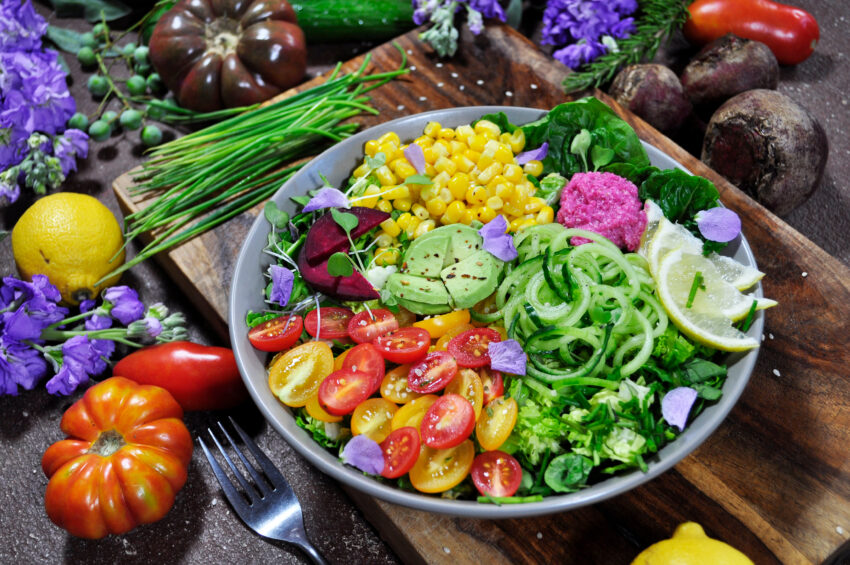A lot of people today are turning vegan. Some for the love of animals while others to say the environment.
A vegan diet consists only of plant-based foods and can provide sufficient nutrition including protein, carbs and fats. That is, of course, if you plan your meals correctly and include high protein foods in each meal.
Why exactly is protein important?
Protein is a part of every cell in the body. It is essential because it repairs tissues, carries oxygen throughout the body, aids digestion, and plays a vital role in hormone regulation. Additionally, it is also the building block of muscles, which is crucial for a fit and agile body.
A diet rich in protein also curbs hunger which helps in weight loss. However, regular exercise is also needed to see sustainable results. You can easily get a good workout from the comfort of your home using a heavy duty elliptical or elliptical bike combo.
Protein-rich vegan food options
Protein is crucial for a well-balanced, healthy diet. It is vital for both weight watchers and weight gainers. Below are some of the best protein-rich vegan food options you can include in your meals.
Soy products
Soy is a whole protein source, and adding soy products to the diet can help meet the daily protein requirements.
100g of raw soybean contains 52g of protein.
Tempeh:
Tempeh is a fantastic protein source revered in the vegan community for its meaty texture and high protein value per 100 grams (19 grams). Tempeh has a nutty flavour and is an incredibly adaptable protein, as you can layer it in sandwiches, crumble or grate it using a cheese grater and add it to soups. In addition, tempeh is a powerhouse of nutrients, as it is rich in B vitamins and minerals (manganese, phosphorus, and calcium) and is also a probiotic.
100g of tempeh contains 19g of protein
Edamame:
You can boil, steam, or air-fry the edamame or add it to your rolls, wraps, and salad to increase your protein intake.
100g of edamame contains 11g of protein
Tofu:
If there’s one food item that vegans swear by, it’s tofu. Although a bland ingredient, tofu is known to acquire the flavour of the paired component. Tofu can be added to tacos, burger patties, curries, and stews and works well with rice items. In addition, tofu can be used in various recipes for lunch and dinner as a versatile protein source.
100g of tofu contains 8g of protein
Soy Milk:
Made from fermented soybeans that are fortified, soy milk is a beverage rich in calcium, iron, protein, and other minerals. Add it to your coffee, tea, or even the overnight oats jar for a hearty breakfast meal.
100ml of soy milk contains 3.4g of protein.
Nuts
Nuts are a powerhouse of protein and energy only when consumed in the correct portion sizes. A handful of nuts go a long way, as 100g has 16.1g of protein. But it also has 617 calories, making them a calorie-dense snack.
Nuts add flavour and variety when used in smoothies, sandwiches, salad dressings, or paired with yoghurt as a filling meal choice. You can eat a handful as a 4 p.m. snack.
Alternatively, you can also use nut butter as a delicious protein source. Just smear it on a bread slice or rice cake or pair it with fresh fruit.
Plant-based Protein Powders
Plant-based protein powders are accessible and help you easily achieve your daily protein requirement. In addition, these high-quality supplements help in protein absorption and fuel the body for muscle building.
Soy is one of the most common sources of vegan protein powders since it is also a complete protein. However, some people are allergic to soy or want to avoid soy products. Therefore, they should consider picking a soy-free protein powder to meet their nutritional requirements.
Lentils & Legumes
To improve the amino acid profile in your body, ensure that you add a variety of lentils and legumes to your daily diet.
One of the best ways to consume lentils is to resort to the age-old Indian dal, a protein and fibre-rich food choice. Lentil dals and soup pair well with rice and bread and is a healthy lunch/dinner option. In addition, lentil salads work as a filling mid-day meal option.
Chickpeas, kidney beans, and sprouted legumes are the top protein sources, and you can have them as hummus, layer them in sandwiches, enchiladas, burrito bowls or even add them to rice.
100g of lentils contain 22-26g of protein.
Chia Seeds & Hemp Seeds
Add the seeds to your puddings for dessert, overnight oat jars for breakfast, or include them in your home energy bars or granola. Hemp seeds contain 9 grams of protein per 30-gram serving, and chia seeds contain 5 grams of protein per 28-gram serving, making them a must-consume protein food in a plant-based diet.
Vegan Yoghurt
Yoghurt is a potent beverage that is filling and adds excellent protein value. Pair the yoghurt with seeds, fresh fruits, and granola as a power-packed breakfast option. Various vegan yoghurt options (soy, Greek, coconut, almond, cashew) are available at the supermarket, and you can make them at home too.
100g of soy yoghurt contains 3.5g of protein.
Author Bio
Name: Khushali Shah
Occupation: Co-owner of healthyandkhush.com
Summary:
Hi, I’m Khushali. I have struggled with weight loss my whole life. Having lost over 25kgs in the last few years, I have learnt a thing or 2 about weight loss and healthy living. I love to share science based tips and hacks that have worked for me through my blogs.


